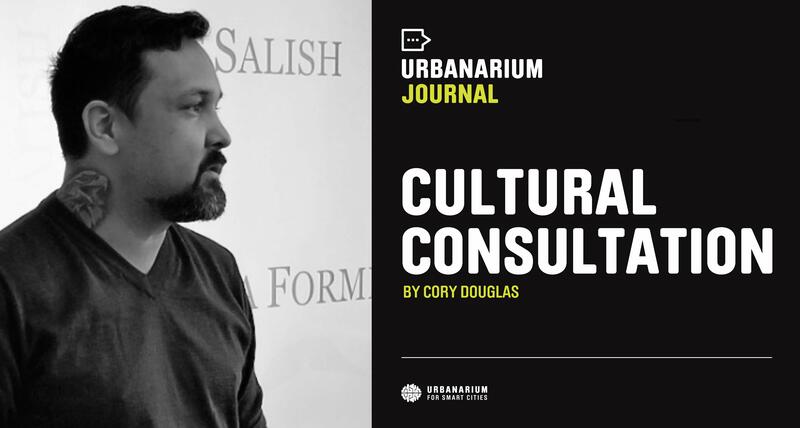
I want to thank Urbanarium for the invitation to participate in The Mixing Middle Competition. It's an honor to represent my Coast Salish communities of MST and share my knowledge with the architectural and planning industry. There are so many projects in these territories that require participants like myself, a member of the Squamish Nation and an independent cultural advisor, to engage with but I am only one of a couple of cultural consultants that have an architectural background and who also practices classic Coast Salish art.
In an environment where only 0.4% of registered architects and landscape architects in Canada are Indigenous, this professional industry must bring on cultural consultants, but remains challenged to know best practices for working with them. While I realize and respect the intentions the Urbanarium made, I want to share my ideas of how organizations can move forward better by setting consultants up properly so that they can have an appropriate level of participation.
I was hired as a technical advisor for The Mixing Middle Competition to bring a cultural perspective to the competition process and scheme evaluations. Prior to jury deliberation day, I found reviewing the competition schemes challenging because there wasn't anything for me to really evaluate, culturally speaking. The participants had not been directed to provide any cultural elements such as structural articulation of the cultural or social values of the Indigenous communities of the four competition sites: Coquitlam, North Vancouver, Surrey, and Vancouver, in their design. The other technical advisors brought on to assist the jury were a Retail/Economic Development Specialist and a Sustainability Specialist. These areas had direct connection to the judging criteria such as micro mobility, anticipated business improvement and implementability and thus, those areas were responded to well in the submissions.
On the jury deliberation day, there wasn't enough for me to advise on and I felt a bit out of place. This is common. Cultural advisors are challenged to find a voice to support architects, planners and developers in a growing industry of big projects where so many of the professionals know very little about the territories to whom they work and live.
As we collectively become aware and recognise BC’s history and strive to reconcile as a way to move forward in a more harmonious integrated modern day, how do we address land rights, encourage design responses to specific place-based narratives and appropriately integrate the design of our values, stories and artforms throughout the process of building?
I think the most important thing is to bring on a cultural advisor at the beginning of the planning process.
Launching the project with a lead advisor will better help decolonize the projects’ schedule, process and structure. Bringing on Black and Indigenious Knowledge Keepers and other culturally appropriate team members early on as jury members, technical advisors and staff —who know the history, legends, language and practices of the area—will further establish a culturally integrated competition.
The promise of having “experts” convened to create the competition brief and award the prizes comes with “high” standards not necessarily relevant to First Nations communities and governance. Professional standards of accreditation do not align with the deep rooted knowledge that members of Indiginous communities hold. It would be great to see AIBC meet the standards that First Nations want the Industry to reach instead of vice versa.
For the next Urbanarium Competition the submission requirements and/or judging criteria should include something that will ensure the cultural advisor has something to respond to. There are many ways the competitors could be culturally supported as they work through their respective design ideas and strategies.
These are international, open competitions and where the project is located means something. Have the participants understand the place—whose traditional territory it is located on, what the forces are that have shaped these communities, and who has been displaced in the process. Along with a land acknowledgement, the responsibilities that we all share in the industry should start the competition description and the teams should be encouraged to do their own research.
Creating relevant cultural material for the teams to pull from, refer to, and use to influence their designs, such as a Terms of Reference, would be helpful. For example, I noticed terms that appeared in submissions that varied from our local practices, such as how in this region First Nations communities here are not tribes, they are Nations (Indigenous Peoples in Canada includes First Nations, Inuit, and Métis people), and how we use unceded to mean that First Nations people never ceded or legally signed away their lands to the Crown or to Canada. The cultural advisor can work with the committee and jury to establish how to best evaluate a decolonized approach to neighbourhood building.
I am encouraged with what I am seeing today. There are far more opportunities for consultants like me to ensure that voices from my community are heard. The industry, local municipalities, schools, the private sector, and developers are supporting the maturing of these types of relationships and seem to be moving towards the truth and inclusivity in growing the greater Vancouver area with Coast Salish peoples.
I leave this contract having had good conversations with Urbanarium. I feel encouraged and inspired by the ideas that came out of The Mixing Middle Competition and with the possibility of returning to help advise on appropriate strategies to support the indigenizing of Urbanarium Competitions in the years to come.